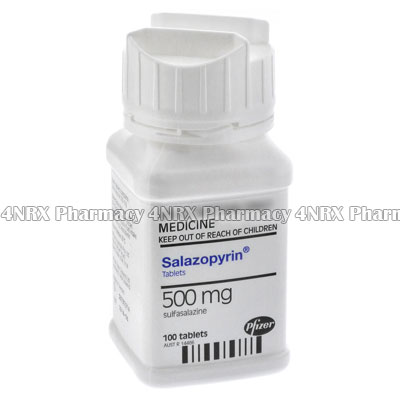 |
Home  Stomach Stomach  Salazopyrin (Sulfasalazine) Salazopyrin (Sulfasalazine) |
|
|||||||||
|
|
Salazopyrin (Sulfasalazine)
What is Salazopyrin (Sulfasalazine) used for? Salazopyrin (Sulfasalazine) is an anti-inflammatory medication used to treat patients suffering from ulcerative colitis or Crohn's disease. It is a sulfa drug that operates by reducing symptoms associated with this condition including fever, stomach pain, diarrhea, and rectal bleeding. The anti-inflammatory properties of this medication also make it useful for treating rheumatoid arthritis. Your physician may recommend its use for the treatment of other unlisted conditions, as well. How should I use Salazopyrin (Sulfasalazine)? Always use Salazopyrin (Sulfasalazine) according to your physician's instructions to get the safest and most effective results from treatment. Most patients are prescribed one tablet to be taken after a meal to prevent nausea. You may also be prescribed a lower dose that is gradually increased to reduce stomach upset. Your individual directions will depend on your age, weight, health condition, the condition being treated, and the severity of your symptoms. Do not split, chew, or crush the tablets unless told to do so by your physician to avoid unintentionally destroying or altering the effects of their contents. Ask your physician any questions you have about the medicine to ensure the correct usage. What are the side effects of Salazopyrin (Sulfasalazine)? Salazopyrin (Sulfasalazine) may cause side effects in some patients such as:
Contact your physician as soon as possible if any serious or worrying symptom occur including faintness, fever, flu symptoms, increased heart rate, chest pain, sensitive skin, easier bruising, severe kidney problems, or signs of an allergic reaction such as hives, skin rashes, swelling, or difficulty breathing. These conditions may require lower doses, reduced frequency of administration, or immediate medical attention in serious cases to prevent further complications from occurring. Please Note Do not begin using Salazopyrin (Sulfasalazine) if you are allergic to sulphonamide medications, allergic to salicylates (such as aspirin), if you have porphyrias, or if the patient being treated is under the age of two. It is also important to inform your physician if you have a history of allergies, a G6PD deficiency, disturbances in blood cell counts, reduced kidney function, or reduced liver function. These conditions may cause unexpected health problems requiring special alterations to your regimen. Strictly follow all instructions provided to you by your physician or pharmacist while using Salazopyrin (Sulfasalazine). Optimum and safe dosage can differ based on the patient and the condition being treated. As this medication may be unsafe for certain patients, it is essential you always inform your physician if you are pregnant or breastfeeding, as well as if you have any allergies, other illnesses, or ongoing health conditions, and if you are taking any other form of medication, supplements, or herbal products. Immediately seek emergency medical care if you have an allergic or hypersensitive reaction. Common signs of a reaction include hives, swelling, skin rashes, chest pains, as well as trouble breathing or swallowing. 
|
||||||||||||||||||||||